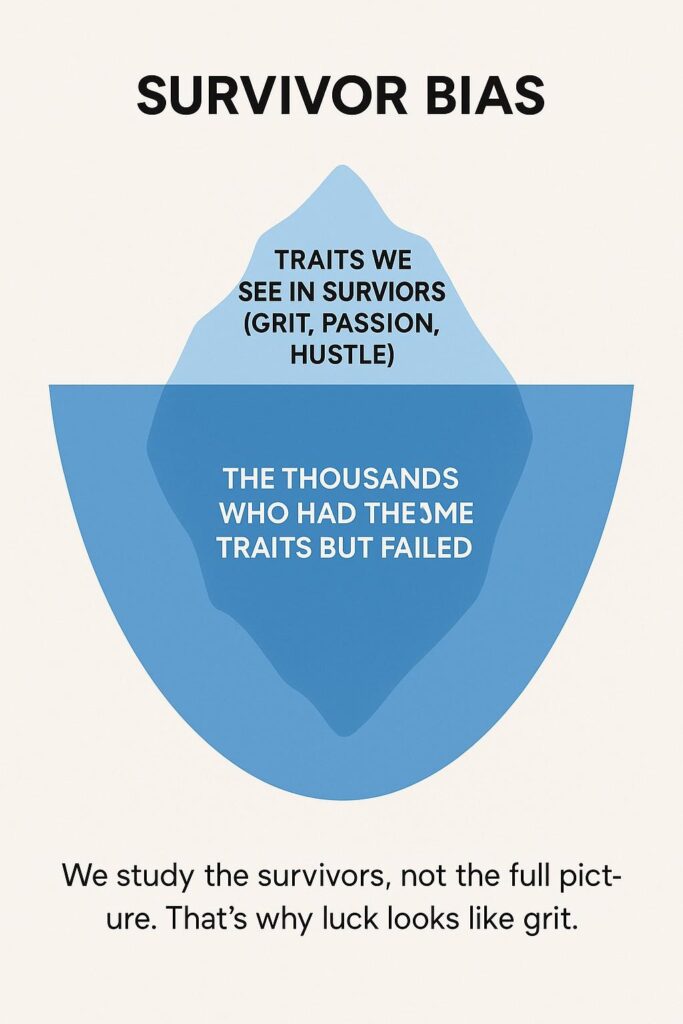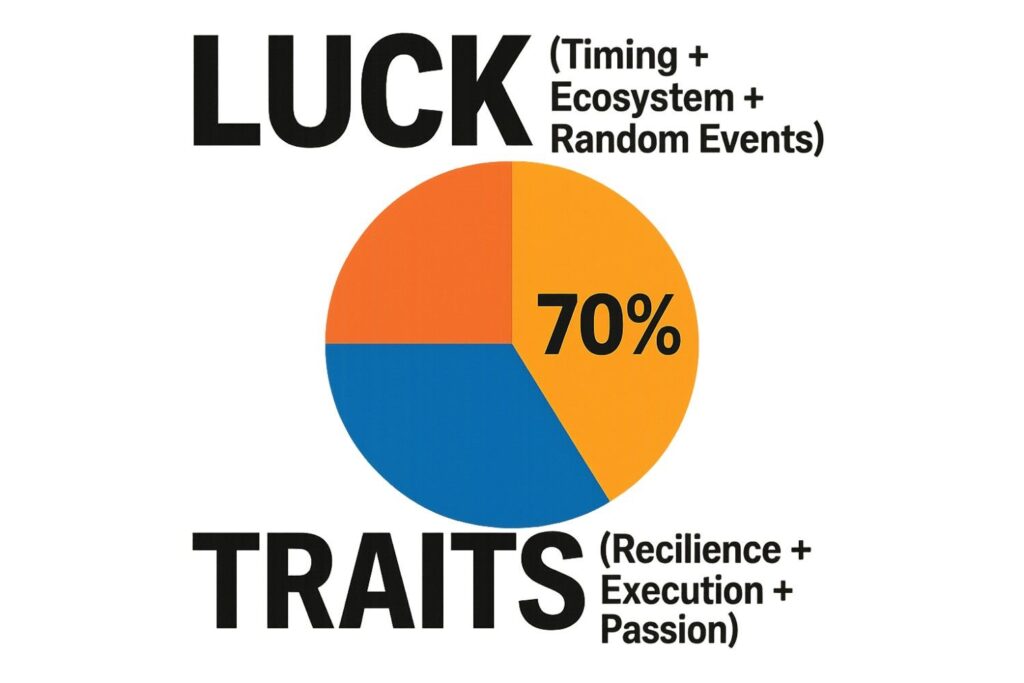Table Of Content
- The Startup Success Myth
- The Survivor Bias Trap
- How Luck Impacts Startup Success: The Data
- Luck vs Hard Work in Startup Success
- Does Timing Matter More Than Founder Traits?
- Why Startups Fail Despite Founder Traits
- Examples of Luck in Startup Success
- The Bharat Context: Luck Sensitivity in Emerging Ecosystems
- The Contrarian Takeaway: Respect Luck, Don’t Worship Traits
- Final Verdict
The Startup Success Myth
Every founder has read some version of this: “7 Traits of Successful Startups,” “22 Tips From Founders,” or “What Makes a Startup Last.” The answers rarely change—resilience, passion, hustle, customer obsession, vision.
But let’s be blunt. If those traits explained startup success, why do 90% of startups still fail? Why do equally resilient, passionate, and visionary founders shut down their companies every year?
The truth is harsh but necessary: luck explains startup success better than any founder trait.
Traits make for good LinkedIn posts. But when we zoom out, what really separates the survivors from the failures is something founders can’t control—timing, randomness, and ecosystem luck.
The Survivor Bias Trap

To understand why luck plays such a defining role, we must confront survivor bias.
We love studying winners—Airbnb, Flipkart, Zoom—and assume their traits made them successful. But thousands of equally passionate, resilient, and hardworking founders followed the same playbook and still failed. They disappear from history, leaving us with a distorted view.
- Elon Musk is celebrated for grit, but countless gritty founders shut down without recognition.
- Jeff Bezos is lauded for customer obsession, yet hundreds of equally obsessed founders couldn’t crack distribution.
- Steve Jobs is idolized for vision, but thousands of visionaries were simply too early—or too unlucky.
This is why startup survivor bias explained is so important: traits look causal only when filtered through the lens of survivors.
How Luck Impacts Startup Success: The Data

Research backs this contrarian view:
- Harvard & Duke study (2019): Market timing explained startup success more strongly than founder traits or backgrounds, accounting for 42% of outcomes.
- Paul Graham (Y Combinator): “A startup’s outcome depends far more on luck than most founders want to admit.”
- CB Insights 2023 Report: The top three reasons startups fail—no market need (42%), ran out of cash (29%), outcompeted (19%)—are mostly external factors beyond “grit” or “vision.”
This isn’t to say execution doesn’t matter. But when analyzing how luck impacts startup success, we see that chance determines whether traits even get a chance to shine.
Luck vs Hard Work in Startup Success
One of the biggest myths in entrepreneurship is the debate of luck vs hard work in startup success.
Conventional wisdom says: “Work hard, stay resilient, and results will follow.”
Reality looks different:
- Passion blinds founders to dead markets. They stick around too long, mistaking obsession for strategy.
- Resilience is celebrated only when luck eventually rewards persistence. Thousands of equally resilient founders are forgotten.
- Hustle burns out founders who picked the wrong timing. The dotcom crash and crypto winter are littered with stories of hustlers who still lost.
Hard work helps, but luck decides whether that hard work compounds—or collapses.
Does Timing Matter More Than Founder Traits?
Let’s test a contrarian question: does timing matter more than founder traits?
History suggests yes:
- Airbnb wasn’t just clever—it launched during the 2008 financial crisis when people desperately needed income and cheap stays.
- Zoom didn’t dominate on product alone—it was lucky enough to be perfectly positioned when COVID-19 lockdowns hit.
- Flipkart scaled because India’s digital payments, logistics, and consumer trust matured at the right time—not because the founders were uniquely visionary.
Traits helped these teams execute, but timing luck was the tide that lifted them.
Why Startups Fail Despite Founder Traits
If grit, vision, and hustle were magic formulas, startups wouldn’t fail in droves. Yet they do.
Why startups fail despite founder traits:
- They pick a great product but a dead market.
- They hustle endlessly but are crushed by external shocks.
- They are resilient but burn cash in ecosystems not yet ready.
In short, traits don’t protect founders from randomness.
Examples of Luck in Startup Success
Let’s ground this in reality: examples of luck in startup success are everywhere.
- Instagram started as a clunky check-in app (Burbn). Luck struck when photo-sharing became a sudden cultural obsession.
- Paytm was one of many digital wallets. The demonetization wave of 2016 created mass adoption overnight.
- Oyo Rooms scaled during India’s smartphone explosion, riding the digital wave more than founder charisma.
These companies had hardworking teams, but their exponential success hinged on external luck events.
The Bharat Context: Luck Sensitivity in Emerging Ecosystems
For Tier-2, Tier-3, and rural founders in Bharat, luck’s role is even sharper.
- Brilliant rural innovators often fail not due to lack of grit, but because infrastructure or investor appetite hasn’t caught up.
- Ecosystem gaps—logistics, internet penetration, local capital—make luck of timing far more decisive.
- Meanwhile, average ideas catch fire simply because they align with government policies, cultural shifts, or sudden consumer demand.
In emerging ecosystems, luck is the multiplier. Traits are secondary.
The Contrarian Takeaway: Respect Luck, Don’t Worship Traits
Here’s the blunt truth:
- Startup media oversells founder traits because they’re inspiring and easy to package.
- Luck explains startup success better than grit, passion, or vision.
- Traits only matter if luck creates the opening.
For founders, the lesson is not to surrender to chance, but to:
- Acknowledge luck’s role. It builds humility and realism.
- Maximize surface area for luck. Talk to more people, run more experiments, stay open to pivots.
- Avoid survivor bias. Don’t blindly copy unicorns without context.
Final Verdict
The next time someone claims passion, resilience, or hustle made them successful, remember this:
For every survivor who says that, hundreds with the same traits failed.
It wasn’t their passion.
It wasn’t their grit.
It wasn’t their hustle.
It was luck—timing, randomness, ecosystem waves—and then the ability to ride it.
That’s the contrarian truth startup media rarely admits.




